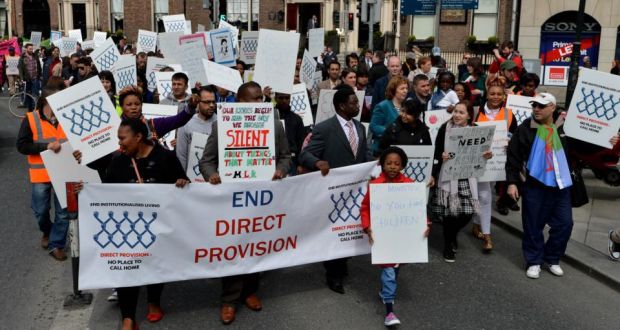You may have seen posters entitled “Boycott Westland Eats” dotted around campus over the past week, or perhaps you came across a similar post at some point on Facebook. Maybe this is the first time that you’ve read about it. Either way, it sounds pedantic at first – why should you, of all people, boycott Westland Eats? What have
a couple of restaurants ever done to make you consider avoiding them completely?
So often, articles like this are compiled with the intention of convincing the reader to agree with the message that they convey: “Here are 10 reasons why you should put that slice of steak down and never eat meat again.” Plenty of people before me have written with this intention about direct provision, and have done so with far better words than I could hope to command. Instead, my only desire is that, you, the reader, reflect on the following question: what would it take for you to participate in a boycott of Westland Eats, if you were asked to do so? To reflect on this has significance beyond simply providing an answer. I like to think that it allows you to reflect on what you take to be important in life.
When you go to a restaurant, after your order arrives and you put the first spoonful of food in your mouth, you implicitly expect that it is fresh, properly cooked and safe to eat. So, if you were ever to have the unfortunate experience of picking out a thread of cooked hair from your teeth between a mouthful of food, or if you were ever to develop food poisoning from something you ate, not only would you probably be shocked and angry, but you’d also expect some form of apology or compensation. Surely there have to be consequences for poor service, right?
It’s a surprisingly common sentiment to feel, after contemplating the sad state of the world, that as much as we’d like to make a difference, we simply don’t know where to start
If you’ve ever used public transport, you’ll appreciate the value of punctuality. When boarding a bus to get to college, you implicitly expect to reach your destination in a reasonable amount of time. Surely, a bus that constantly breaks down, and never reaches its destination in a reasonable amount of time, is no good, right?
What has any of this got to do with boycotting Westland Eats, though? Over the summer, it came to light that the establishment of Westland Eats on campus came after an agreement between Trinity’s Commercial Revenue Unit and Aramark. Aramark happens to be the same company contracted by the Irish government to provide services such as catering to direct provision centres across the country.
Now, try to put yourself in the position of an asylum seeker in Ireland. Every day, you walk into the dining area of the direct provision centre that you have been taken to and you are served a plate of food, after being told that you’d only be staying there for a short while (a maximum of six months, to be exact) while your application for asylum is processed. One day, the food smells funny. Another day, you are scratching your head, wondering why your stomach hurts. Before you know it, you have been sleeping in the same room, eating the same food and waiting for the same result for over four years.
Four years is a long time. It’s the time it takes to get a degree in Trinity, and anyone who has completed those four years within the confines of our gated community can tell you of how many memories, how many accomplishments and milestones were reached during that timeframe, for better or worse.
It’s a surprisingly common sentiment to feel, after contemplating the sad state of the world, that as much as we’d like to make a difference, we simply don’t know where to start, never mind whether we can even make a difference at all in the first place. So why bother trying?
Contrast this with the equally common sentiment, whereby we like to think that, if ever we were placed in a situation where we had the means to make a difference, that we would do so without a second thought. If you, as a competent swimmer and at no immediate risk, were to come across a pool where a child was drowning, and no one else was there to help, would you jump in to save them? If you couldn’t swim, would you at least yell for help?
Now, think about this with sincerity: if you knew that a company had a history of poor service to vulnerable people, and made a profit out of that same poor service with no immediate repercussions, would you look unfavourably on that company? If you knew that someone, not too far away from you, had no choice but to eat from that provider, with no idea how much longer they’d have to live that way, would you wish for that to change? So, if you were to witness that same company setting up shop in your vicinity, knowing what you know about its dealings, would you still choose to walk into that shop, buy from it and bite into its produce?
Giordan Castellon is a member of the campaign to boycott Westland Eats.







